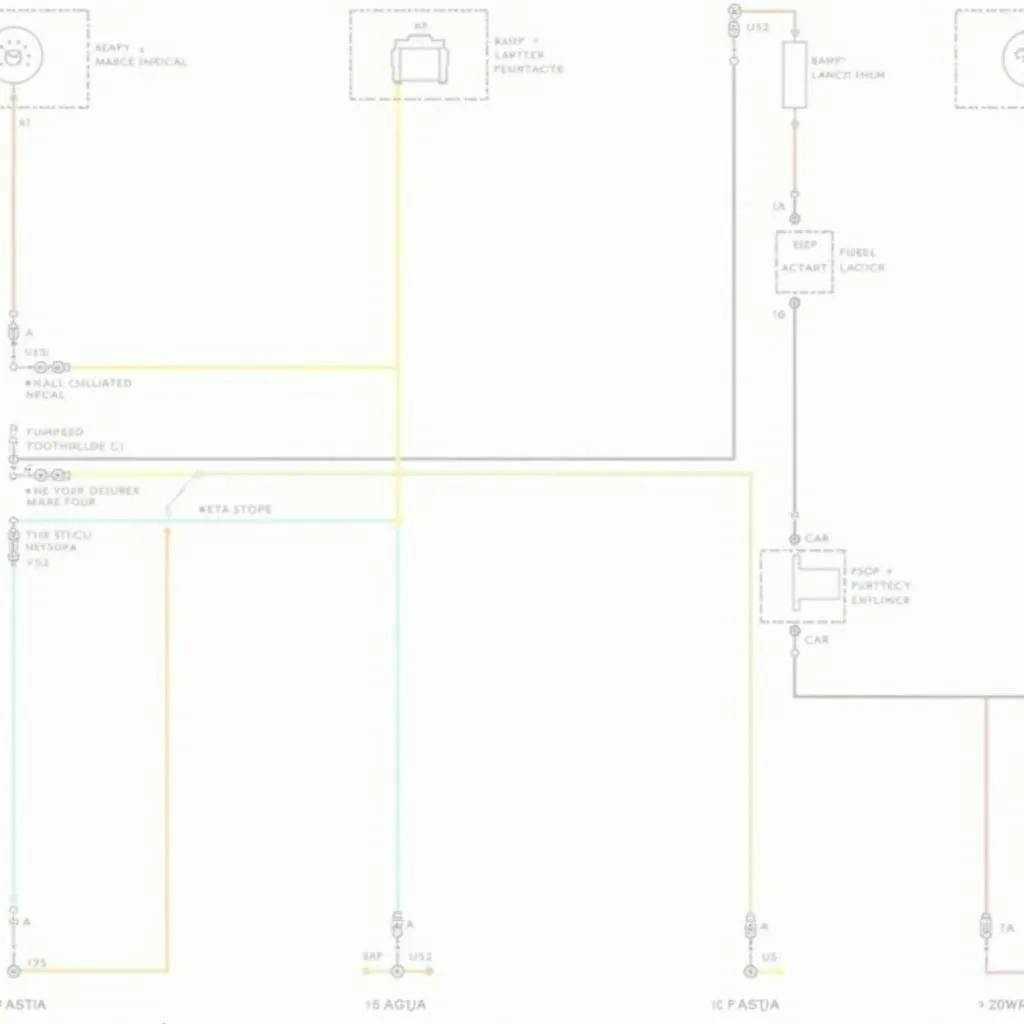The “AdBlue” warning light on your BMW can be a bit of a scare. It’s not a light you want to ignore, and it’s often a sign that something needs attention. However, understanding what it means and how to handle it can save you stress and expense.
This guide will break down everything you need to know about BMW AdBlue warnings. We’ll cover the causes, potential solutions, and how to prevent this issue from happening again.
What is AdBlue?
AdBlue is a solution that helps reduce harmful emissions from diesel engines. It’s a urea-based fluid that’s injected into the exhaust system, breaking down nitrogen oxides (NOx) into harmless nitrogen and water. All modern diesel BMWs require AdBlue.
Understanding BMW AdBlue Warnings
BMW AdBlue warning lights come in different forms, each indicating a specific issue. Here’s a breakdown:
1. AdBlue Low Level Warning
This warning typically appears when your AdBlue tank is getting low. It’s a friendly reminder to top off your tank soon to avoid any complications.
2. AdBlue Reserve Warning
If you’ve been neglecting the AdBlue low level warning, you may encounter the “Reserve” warning. This means you have a limited amount of AdBlue left and need to add more immediately.
3. AdBlue System Malfunction Warning
This warning is the most serious. It indicates a problem with the AdBlue system itself, which could be anything from a clogged nozzle to a faulty sensor.
Common Causes of BMW AdBlue Warnings
Here’s a closer look at the most frequent culprits behind AdBlue warnings:
1. Low AdBlue Level:
This is the most straightforward cause. Simply top off your AdBlue tank with the appropriate fluid, and the warning should clear.
2. Defective AdBlue Sensor:
Your BMW’s AdBlue system relies on sensors to monitor fluid levels and ensure correct injection. A faulty sensor can trigger false warnings.
3. Clogged AdBlue Nozzle:
The AdBlue nozzle is responsible for injecting the fluid into the exhaust system. If it becomes clogged, the system won’t function correctly, leading to warnings.
4. AdBlue Pump Failure:
The pump responsible for delivering AdBlue to the nozzle can malfunction, hindering the system’s operation.
5. AdBlue Tank Issues:
Cracks, leaks, or other damage to the AdBlue tank can cause fluid loss and trigger warnings.
How to Resolve BMW AdBlue Warnings
The solution to your AdBlue warning depends on its root cause. Here’s a step-by-step approach:
-
Check Your AdBlue Level: The first step is to check your AdBlue tank level. If it’s low, simply add more AdBlue to the appropriate level.
-
Verify Sensor Function: If adding AdBlue doesn’t resolve the warning, you may have a faulty sensor. You can attempt to reset the sensor by disconnecting the battery for a few minutes. This might clear the warning temporarily. If the warning persists, it’s advisable to have the sensor diagnosed and potentially replaced.
-
Inspect AdBlue Nozzle: Inspect the AdBlue nozzle for any blockages or debris. If necessary, clean or replace it.
-
Inspect AdBlue Pump: The pump’s functionality is essential for AdBlue distribution. If you suspect a pump issue, it’s best to have it inspected and potentially replaced by a qualified mechanic.
-
Examine AdBlue Tank: Inspect the AdBlue tank for any leaks or damage. If you discover any issues, the tank may need to be repaired or replaced.
How to Prevent BMW AdBlue Warnings
Here are some tips to avoid future AdBlue issues:
-
Regular AdBlue Top-Ups: Make it a habit to check your AdBlue level regularly and top it off as needed.
-
Use Quality AdBlue: Use only approved AdBlue fluid from reputable sources to avoid potential problems.
-
Prevent AdBlue Tank Damage: Park your car in areas free of potential hazards, like sharp objects or chemicals that could damage the AdBlue tank.
-
Regular Maintenance: Have your BMW regularly serviced, including inspections of the AdBlue system, by a qualified technician.
BMW AdBlue Warning Light: FAQs
Q: Can I drive with a BMW AdBlue warning?
A: In most cases, it’s safe to drive with a low AdBlue warning for a short period, but you should address it as soon as possible. Driving with a malfunctioning AdBlue system is not recommended as it can lead to engine problems and may even affect the vehicle’s emissions certification.
Q: How much does it cost to fix an AdBlue warning?
A: The cost of fixing an AdBlue warning can vary based on the specific issue. Adding AdBlue is the cheapest solution, while more complex repairs like sensor replacement or pump repair can be more expensive.
Q: How often should I check my AdBlue level?
A: It’s a good practice to check your AdBlue level every 1,000 miles or so, especially if you frequently drive long distances.
Q: Can I add water to my AdBlue tank?
A: No, never add water to your AdBlue tank. Water can damage the AdBlue system and render it ineffective.
Q: Is AdBlue dangerous?
A: AdBlue itself is not dangerous, but it’s essential to avoid contact with eyes and skin. If you get AdBlue on your skin, wash it off with soap and water. If it gets in your eyes, flush them with water for 15 minutes and seek medical attention.
Q: How much does AdBlue cost?
A: AdBlue is relatively inexpensive, costing around $10-$15 for a 2.5 gallon container.
Conclusion
While BMW AdBlue warnings can be a source of stress, they’re usually easy to resolve. By understanding the causes and potential solutions, you can quickly address these warnings and keep your BMW running smoothly. Remember, regular maintenance and proactive steps can help prevent these issues from occurring in the first place.

